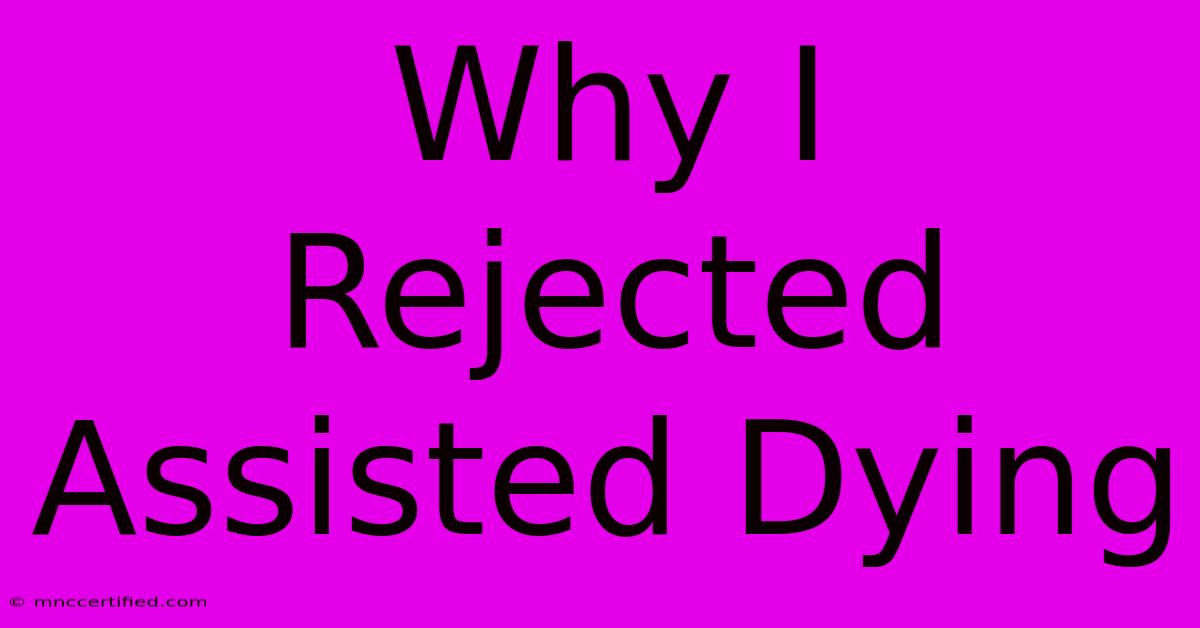Why I Rejected Assisted Dying

Table of Contents
Why I Rejected Assisted Dying: A Personal Journey
Assisted dying, also known as physician-assisted suicide or aid in dying, is a deeply complex and emotionally charged issue. While I understand the arguments for its legalization and the suffering it aims to alleviate, I ultimately rejected the idea for myself, and this is my personal account of why. This isn't a judgment on those who choose a different path; it's a reflection of my own beliefs and experiences.
The Weight of the Decision: Facing Mortality
The decision to even consider assisted dying is monumental. It's a confrontation with one's own mortality, a grappling with the limitations of medicine and the inevitability of death. For me, this contemplation wasn't born out of unbearable physical pain, although I have experienced my share of health challenges. It stemmed from a different source: a deep-seated belief in the sanctity of life and the inherent value of human existence, regardless of suffering.
The Power of Hope and Unexpected Resilience
My journey towards understanding my own position on assisted dying was gradual. I've witnessed firsthand the remarkable resilience of the human spirit. People facing seemingly insurmountable odds often find unexpected strength and even joy in the face of adversity. This capacity for hope, for finding meaning even in the darkest of times, is something I believe should be nurtured and protected, not prematurely extinguished. The possibility of unexpected healing or moments of peace, even in the face of terminal illness, should not be discounted.
Beyond Physical Pain: Addressing the Emotional and Spiritual
While physical pain is a significant factor in end-of-life decisions, it's rarely the only consideration. Emotional and spiritual well-being are crucial components of a holistic approach to life and death. Assisted dying, I believe, risks neglecting these crucial aspects. It offers a solution that focuses on ending the physical suffering, potentially at the expense of addressing underlying emotional or spiritual pain. For me, exploring these areas, through therapy, spiritual guidance, or simply connecting with loved ones, is paramount.
The Importance of Human Connection and Support
Another significant factor in my rejection of assisted dying is the importance of human connection. During difficult times, the support of loved ones is invaluable. While assisted dying might seem like a path to solitude and control, I believe that fostering strong relationships and seeking support from family, friends, and caregivers is vital during the end stages of life. The shared experience of living and dying is a powerful affirmation of human connection. These connections, and the love they generate, can offer a comfort and peace that no medical intervention can replicate.
Ethical Considerations and the Slippery Slope Argument
The ethical implications of assisted dying are complex and extensive. Concerns about potential abuse, coercion, and the "slippery slope" argument, where the criteria for eligibility might be gradually broadened, are valid and require careful consideration. These concerns underscore the need for rigorous safeguards and ongoing ethical debate. For me, these ethical uncertainties contribute to my apprehension regarding widespread legalization.
Conclusion: Embracing Life's Journey, End and All
My decision to reject assisted dying is a personal one, rooted in my faith, values, and experiences. It's a recognition of the inherent value of human life, even amidst suffering. While I empathize profoundly with those who find themselves in situations where assisted dying seems like the only option, my own perspective leads me to believe that exploring all available avenues of support, treatment, and emotional and spiritual care should be prioritized before considering such a drastic measure. The journey of life, including its end, is precious and deserves to be approached with careful consideration and respect. This is my truth, and I hope sharing it contributes to a more nuanced and compassionate conversation surrounding assisted dying.
Keywords: Assisted dying, physician-assisted suicide, aid in dying, end-of-life care, palliative care, sanctity of life, ethical considerations, personal experience, hope, resilience, human connection, slippery slope, death with dignity.

Thank you for visiting our website wich cover about Why I Rejected Assisted Dying. We hope the information provided has been useful to you. Feel free to contact us if you have any questions or need further assistance. See you next time and dont miss to bookmark.
Featured Posts
-
Who Is The Obligee On A Bond
Nov 30, 2024
-
Jack Daniels Bonded Whiskey
Nov 30, 2024
-
From Pizza Express To Stephen Mulherns 2023
Nov 30, 2024
-
Kiss Almighty Bond Lace Glue
Nov 30, 2024
-
Homebase Sale Retail Giants Compete
Nov 30, 2024